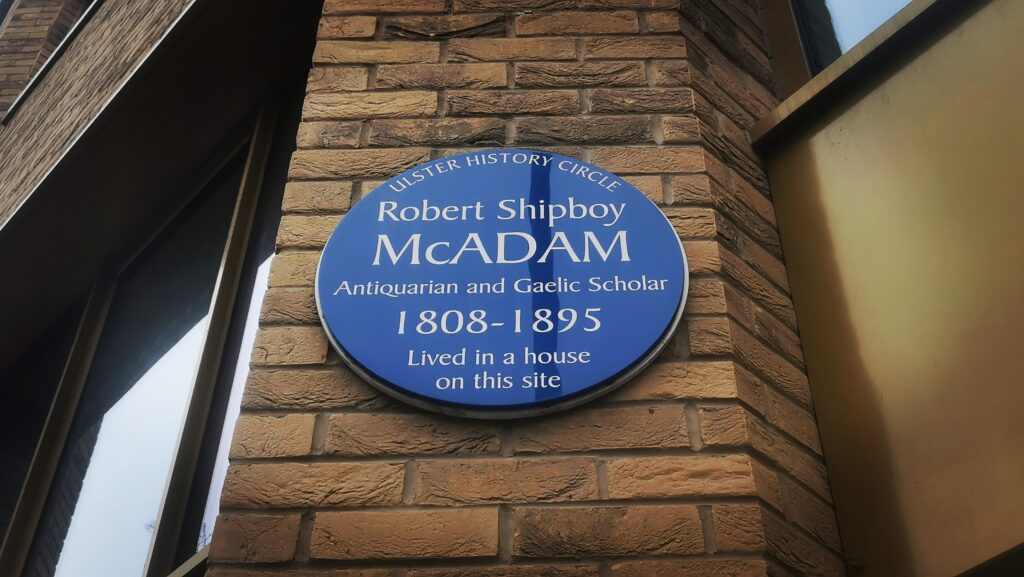The Robert McAdam Comparative Lexicon
The Linen Hall has an expansive and insightful Irish Language collection. Beginning with material dating from the 18th century, the collection is made up of historic and contemporary material – works of history, memoir, fiction, poetry, and linguistics – as well as periodicals and offprints to encourage and support research and linguistic development. It is a living collection which is added to through acquisition and donation.
A treasure of the collection is the Robert McAdam Comparative Lexicon.
Robert Shipboy McAdam was born into the enterprising, commercial class Presbyterian community of Belfast in 1808. Born in High Street, where his father, James McAdam, had a hardware merchant business, neighbours included the McCracken family, Samuel Bryson, and Dr James McDonnell.
Shipboy was the maiden name of Robert’s mother, a native of Coleraine. Robert benefitted from the era of great liberal and intellectual development there had been in Belfast. Educated at the Belfast Academical Institution (known today as the Royal Belfast Academical Institution), and as a keen student of languages, he had the opportunity to learn Irish, one of several languages the highly accomplished linguist would learn, speak, and research during his lifetime.
When Robert’s father died when Robert was in his early teens, Robert, and his brother James (1801-61) took over running the family business, building it up to establishing the Soho Iron Foundry in Townsend Street in 1838. A highly successful business at the time, its patented steam turbine produced products which led Robert McAdam to travel the world selling.

a man of wide culture and refined tastes
Described as a man of wide culture and refined tastes, Robert McAdam was involved in several learned societies in Belfast, such as Cuideacht Gaeilge Uladh (Ulster Gaelic Society). The society was founded in 1830 with Dr McDonnell as Chair, and Rev Dr Reuben J Bryce and Robert McAdam serving as co-secretaries. The aim of the society is recorded as being to collect manuscripts, to employ a teacher of the language, and to publish ‘useful’ books. In 1835, Robert McAdam published An Introduction to the Irish Language intended for the use of the Irish classes in the Royal Belfast Academical Institution.
It is noted that Robert’s interest in the Irish Language was not merely of an academic or antiquarian nature; he was genuinely interested in the language in use, in tools for teaching, and in providing reading material in Irish, and he did much to collect – folklore, poetry, native songs, and airs from across Ireland – and to encourage the study and preservation of same.
The Ulster Journal of Archaeology
In 1852, the British Association for the Advancement of Science meeting was held in Belfast and Robert McAdam was instrumental in bringing together a unique collection of antiquities in the then Belfast Museum. This led to Robert and James McAdam being instrumental in founding the Ulster Journal of Archaeology, established with a mission to collect information on Ireland’s past, fearing it might be lost.
The prospectus for the first volume states ‘the remarkable exhibition of Northern Irish antiquities and historical reliques, at Belfast, on the occasion of the meeting, in that town, of the British Association for the Advancement of Science, has opened up a new and fertile field of archaeology … it is therefore believed, that the present is fitting opportunity for endeavouring to rescue from oblivion what remains of the history of Ulster.’
The first series of the Journal under the editorship of Robert McAdam appeared between 1853 and 1861/2 and took a leading position in literary and archaeological circles. It was published by Archer & Son but owed much of its value to the illustrations of Marcus Ward & Co. Robert’s collection of six hundred proverbs in the Irish Language was first published in the various volumes of this journal.
Robert McAdam also had a long association with the Belfast Literary Society, the Belfast Natural History and Philosophical Society, and the Linen Hall LIbrary, where both his father, his brother and he were Governors. The death of Robert’s brother James in 1861 was marked in the Library’s minute books. And shortly thereafter, Robert is recorded as a committee member of the Library from 1862.
A handwritten comparative lexicon of the Irish Language
In the latter stages of his life, Robert largely withdrew from public life, and in or around 1885, compiled a handwritten comparative lexicon of the Irish Language which, along with the also unpublished English-Irish Dictionary (22 volumes), were his most ambitious works in Irish, and together represent a major contribution to the canon of Irish scholarship. The historical and cultural significance of the Comparative Lexicon cannot be overstated; it is an inspiring and insightful work which has relevance and value to the use and understanding of the Irish Language in contemporary life.
Robert’s aim was to facilitate comparison of some 13,000 Irish headwords (drawn from contemporary published sources such as those dictionaries of the language compiled by John O’Brien and John Donovan) with 28 other languages: from Scottish and Manx Gaelic to Sanskrit. So that a reader might easily compare across the different language columns, Robert McAdam had 11″ x 9″ volumes custom-made, leaving the Irish headwords continually visible.
Robert McAdam’s Comparative Lexicon, in type and scope, is unique. Extant volumes range from the headword brat (covering, mantle) to utumail (roaming abroad) and cognate words from other languages can be seen in Robert’s own hand in the other columns. The lexicon illustrates Robert McAdam as an innovator as this work was carried out at a time when Celtic studies and comparative linguistics, as academic disciplines, were in their infancy, and were being pursued for the most part by academics based in universities on the European continent.
a hugely important part of the history and heritage of Belfast
Robert McAdam died in Belfast on 3 January 1895, and was buried at Newtownbreda on 5 January 1895. An obituary stated, ‘his enthusiasm for all that related to the history of his native province remained unabated.’
Given the McAdam family’s long connection with and support for The Linen Hall Library, it is particularly fitting that we are the custodians of Robert McAdam’s Comparative Lexicon, and thanks to generous funding from Foras na Gaeilge, the lexicon has had remedial and preventative restoration to conserve it undertaken by a specialist paper conservator and was digitally scanned to produce digital surrogate copies. We are privileged to celebrate Robert McAdam and the extant volumes of his fascinating and unique Comparative Lexicon, which is a hugely important part of the history and heritage of Belfast, and to spotlight Foras na Gaeilge support of this unique treasure.
This project was sponsored by Foras na Gaeilge.






